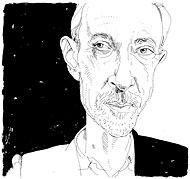
The Buddha said the unlearned disciple is stabbed by “two darts.” The first dart is a painful experience. The second dart is the suffering that results from his poor reaction to the first dart. The learned disciple, by contrast, is stabbed by only one dart, having learned to absorb the first dart with equanimity. I shudder to think of the existence of second darts when the run of first darts in this world—cancer, depression, heartbreak, family estrangement, Jews stuffed in ovens, children mowed down by an anti-Muslim gunman, and all the rest of it—being so full, and so deflating in its fullness. But of course, every second dart becomes a first dart somewhere down the line: today’s bank robber is yesterday’s son of a prostitute.
J.M. Coetzee’s Disgrace is in part the story of a man learning—or better yet, being urged by circumstances to learn—how to disengage the second dart. I say “in part” because Coetzee’s authorial discipline and the strictness of his prose suggest a resistance to a dominant thematic reading (such as this one). He resists the many opportunities for his story to lead emphatically into a single purpose or theme.
David Lurie, an English professor at a middling Cape Town university, suffers two first darts in the novel. The first he fires on himself, losing his job after authorities learn of a dalliance with a student. Coetzee chronicles the girl’s reluctant capitulation to Lurie’s seduction in the first third of the book, and he does not come off well. Channeling Nabokov, Coetzee attempts a rake’s journal, only to sound very much like a writer of another order attempting a rake’s journal. When, after his student comes to his home in distress, Lurie
sits down on the bed, draws her to him. In his arms she begins to sob miserably. Despite all, he feels a tingling of desire. ‘There, there,’ he whispers, trying to comfort her. ‘Tell me what is wrong.’ Almost he says, ‘Tell Daddy what is wrong.’
 There is no confidence here. Self-conscious in this portion of the novel, Coetzee does not trust his reader to notice the obvious paternal resonance. Perhaps the reason—just a guess—is that Coetzee does not trust himself. Coetzee, a known recluse and ascetic in his daily habits, may not be prone to allowing an affair with a student to spread out in the shade of his imagination, out of public sight, where the most dangerous and arresting stories are told.
There is no confidence here. Self-conscious in this portion of the novel, Coetzee does not trust his reader to notice the obvious paternal resonance. Perhaps the reason—just a guess—is that Coetzee does not trust himself. Coetzee, a known recluse and ascetic in his daily habits, may not be prone to allowing an affair with a student to spread out in the shade of his imagination, out of public sight, where the most dangerous and arresting stories are told.
Or perhaps desire is simply not Coetzee’s muse. If it is not, then power is. Disgrace begins to display the mastery that earned it the Booker Prize when a faculty advisory committee attempts to coax repentance from Lurie. Coetzee excels at portraying the asymmetric warfare underneath the dialogue between the accused and his inquisitors—Lurie as the obstinate teenager, a female colleague as the self-righteous mother, and Lurie’s faculty friends as the enabling fathers. Like moves in a game of Chinese checkers, each comment seeks unguarded territory while the player protects his opposite flank.
The university, in the manner of all institutions, grinds down upon Lurie with its crushing, dehumanizing obsession with appearances. For his part, Lurie refuses to use the affair as an opportunity for moral self-inquiry; he insists on meeting the university’s theatrics with a stand on principle in most unsympathetic style. And so Coetzee introduces us to Lurie’s second dart: his inability—to borrow from the rhetoric of the Twelve Steps—to take life on life’s terms. This dart seems to me Lurie’s main troublemaker.
After he is fired, Lurie moves temporarily onto his daughter’s farm in a rural outcrop. Lucy lives a pastoral life, at one with the stray dogs she raises, frequenting the local market to sell her crops. She and dad get along well enough at first, in spite of the cultural differences that have developed between the licentious, urbane professor and his rural-dwelling, lesbian daughter. But their gentle bonhomie fades when they are stung by the novel’s second first dart: father and daughter come home from a walk in the woods to find a strange trio of two men and a boy stirring about Lucy’s home, taunting her dogs. The reportorial detachment and assassin’s precision of Coetzee’s prose render the proceeding episode with vivid, haunting force.
Then, Lurie’s second dart. The dart and its disengagement spreads thickly and deliberately across the novel’s second half. It is foreshadowed by Lurie’s attitude in the first half, and aided by Lurie’s attempt to write an opera about a jilted mistress of Lord Byron. The device initially smacks of the self-reference all-too-common in the fiction of creative writing professors, but, aided by Coetzee’s heartfelt persistence, the device draws the reader to Lurie and enlivens the story.
The rest I leave for the reader. I will only say that, without trying to do so, the novel reminded me that compassion is a wise and courageous reaction, not a weak one, to all the delusive, addicted, pathological, bitter, and angry among us–the people like me. Delusion, addiction, et al., are the second darts of the world, the symptoms of an inability to accept the terms of the first dart. Acceptance may be the first step to a life of contentment, but it is the hardest as well.

COMMENTS
Leave a Reply














